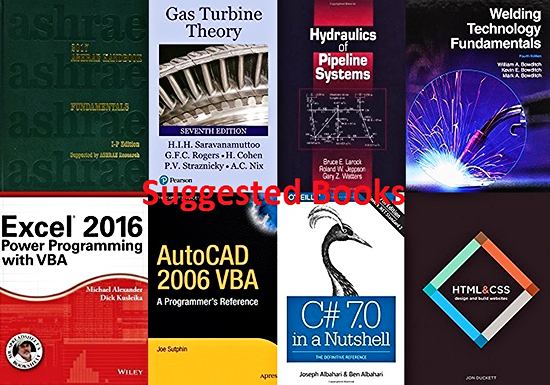Last updated: 30/05/2018, 5 min read
A week ago a blog reader (Hakim) asked my opinion about various books regarding Excel and VBA. After suggesting him some books, I decided to write this post so as to gather all the books that I would like to recommend to anyone who is interested in.
So, this list could be considered as “my favorite books’ list”.
In general, books are a great source of information and, personally speaking, I really enjoy reading and learning new stuff. So, the list that you will find below contains some of the books that I have read in the past and I consider remarkable. Check them out and you might find a new book to read! The books are organized into four broad categories:
- Engineering
- Office, AutoCAD & VBA
- Other programming languages
- Literature
Engineering
Handbooks for various engineering topics
First of all, as a reference for many engineering subjects, I use ASHRAE’s handbooks. They cover in detail many theoretical topics and they also contain practical information. If you are a mechanical engineer these books are an excellent addition to your library:
Fuel cells
My diploma thesis was entitled: “Simulation of a hybrid Solid Oxide Fuel Cell/micro Gas Turbine power generation system”. During the calculation of the fuel cell performance the books below helped me a lot:
Gas turbines
When I was at Cranfield (for my M.Sc. studies), the following book was something like my “holy grail”. So, if you like to learn about gas turbines this book should be a good starting point:
However, when I was writing my M.Sc. thesis the following books have also helped me a lot:
At 2009, during a short course at Cranfield (“Gas turbine design and performance”) I had the pleasure to meet and discuss with professor Saravanamuttoo. He is an expert in his field and a really nice person.
Heat transfer & heat exchangers
For heat transfer, as well as heat exchangers the following book is definitely a must have:
Hydraulics
As a freelancer, I worked on the designing of several hydraulic projects (hydropower plants, open channels, pump stations etc.). The books that follow helped me solve various designing problems:
Internal combustion engines
Whenever I have a theoretical question about internal combustion engines this book has usually the answer:
Piping, welding & pressure vessels
When I was working on a refinery project (as a quality manager) I had to learn a lot of things about piping, welding, as well as pressure vessels. As it turned out, the books below were a good choice:
The topic of renewable energy is enormous. As a freelancer, I have elaborated a few studies about biomass and photovoltaic projects. The books below were a valuable source of information:
Office, AutoCAD & VBA
Excel
If you want to learn basic and more advanced Excel topics, then John Walkenbach is your guy. I have learned a lot of things from his books.
Excel & VBA
If you are new to VBA you should probably start with:
The title is quite misleading since the book can smoothly introduce you to the magic world of (Excel) VBA. If you are not a VBA-newbie, you can read about more advanced topics in these books:
Finally, if you need a book to have it as a reference, try this:
I started learning Access with this book. If you enjoy learning “visually” this book is a good start. However, I should point out that the book focuses on practical things (like how you will do something) and not on the theory behind it.
For more advanced Access topics, as well as VBA, check these books:
During my undergraduate studies, I started learning AutoCAD from scratch at my free time using this book.
Since I was familiar with VBA programming (from Office), this book was quite good for expanding my VBA knowledge to the AutoCAD field.
Other programming languages
C#
Apart from CodeEval challenges, you have probably not seen me publishing something about C#. However, in reality, I am developing applications in C# on a daily basis. Here are a few good books to start with:
Visual Basic .NET
My transition from pure Visual Basic/VBA to .NET started with this book. As the title implies the author guides you step by step to the .NET world. There is no need for previous programming knowledge, so I recommend it even to newbies with programming.
I had some basic FORTRAN training during my undergraduate studies. However, my M.Sc. thesis was actually a large FORTRAN application/algorithm for calculating the exhaust emissions from industrial gas turbines. Since I was not so advanced programmer in FORTRAN, I tried to find more resources; the book below helped me a lot:
Web Page Developemnt (HTML, CSS & JavaScript)
To tell you the truth, I started learning HTML in order to customize this blog on my own. So, apart from various online tutorials (like
this one), the following book was a good source of information:
Literature













































